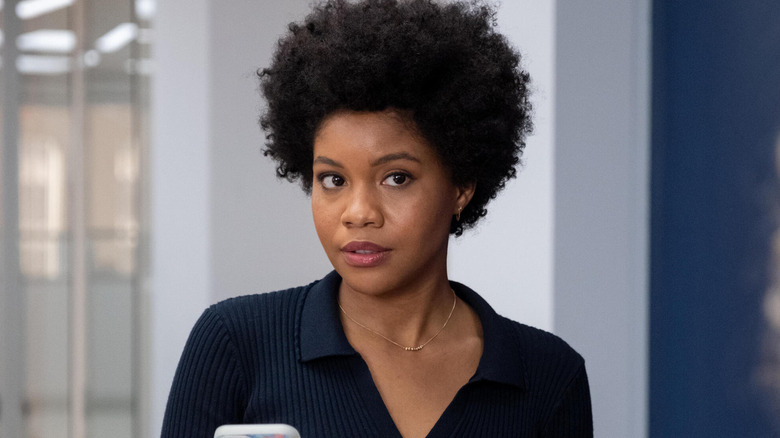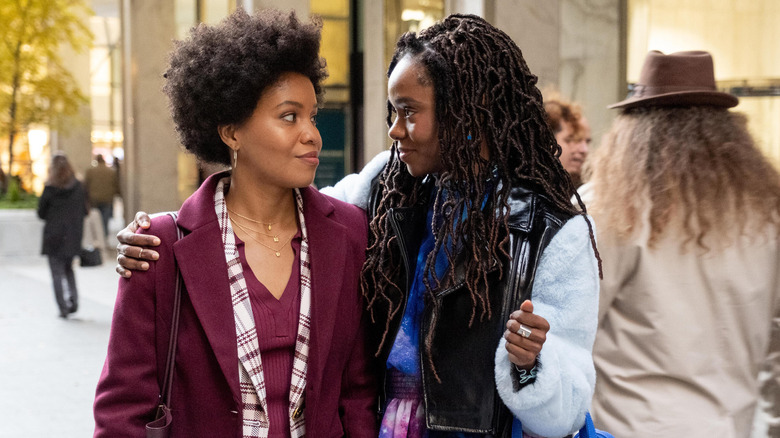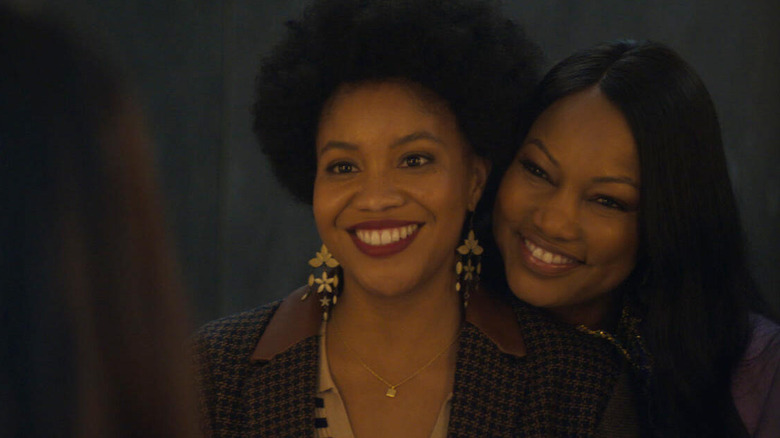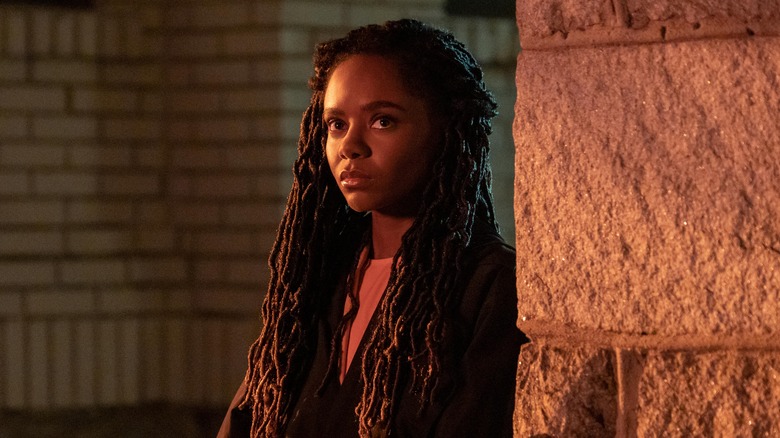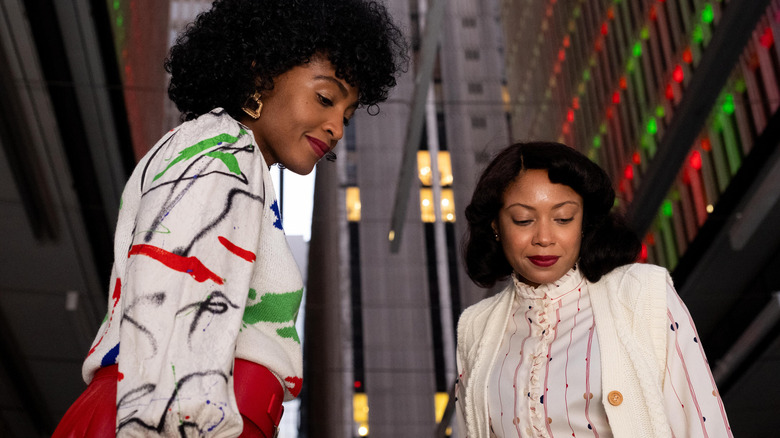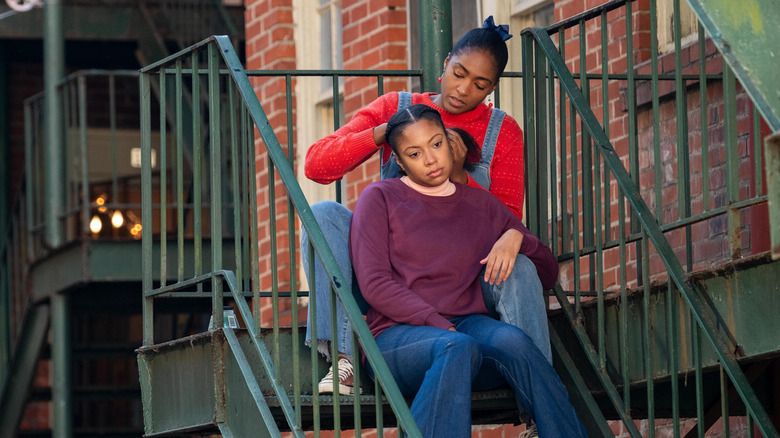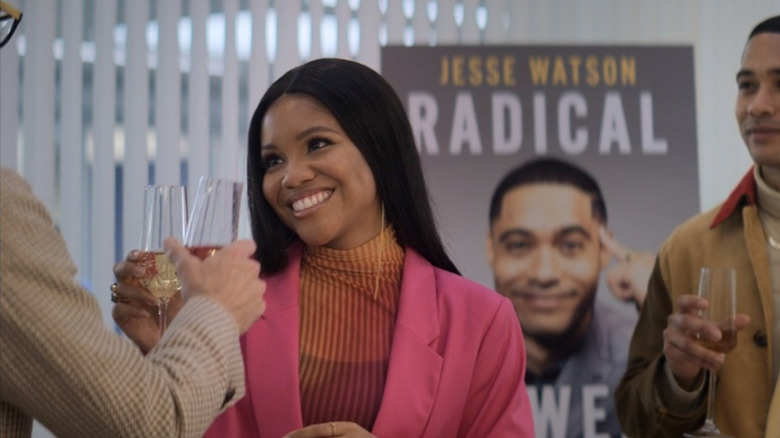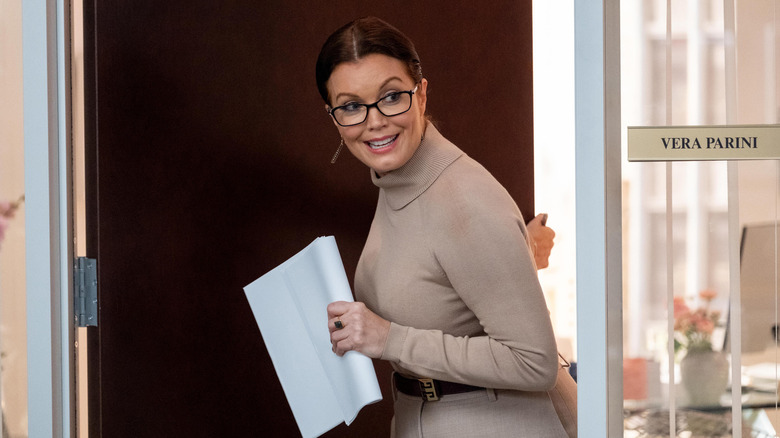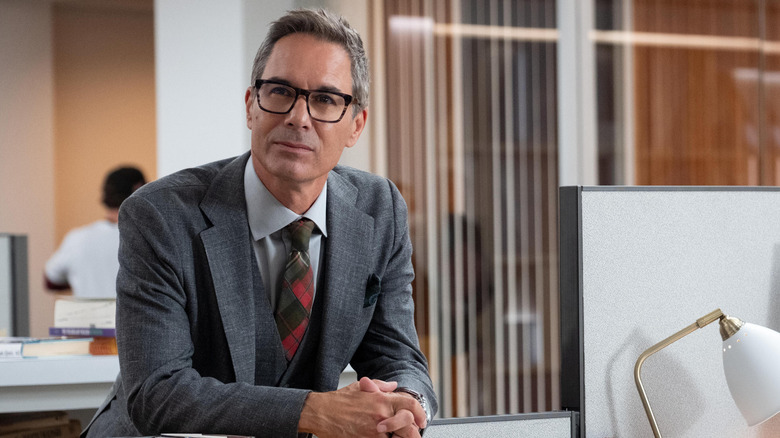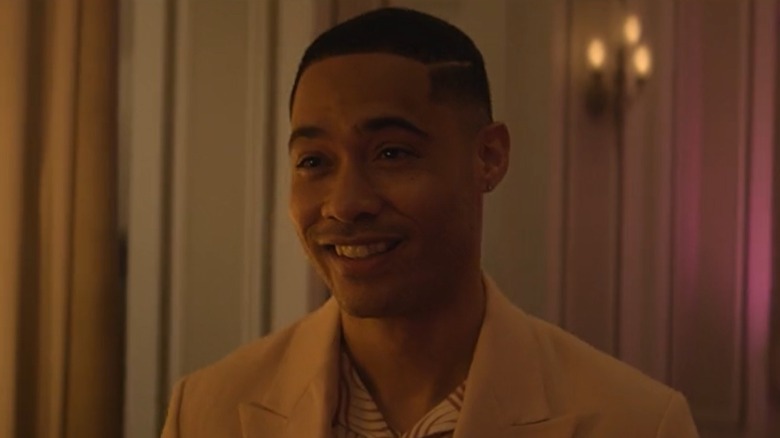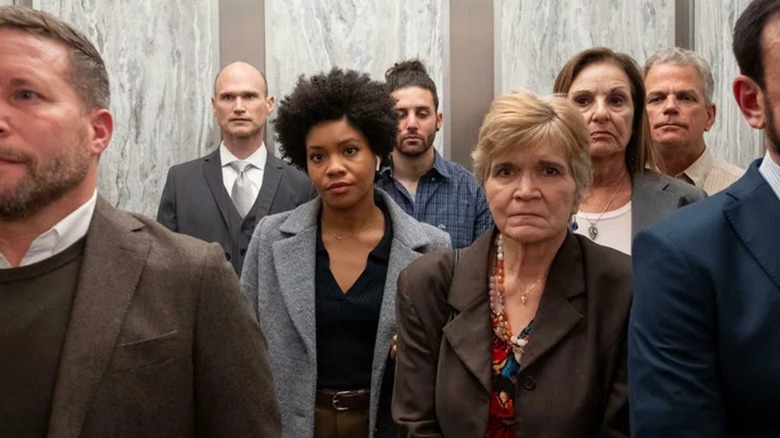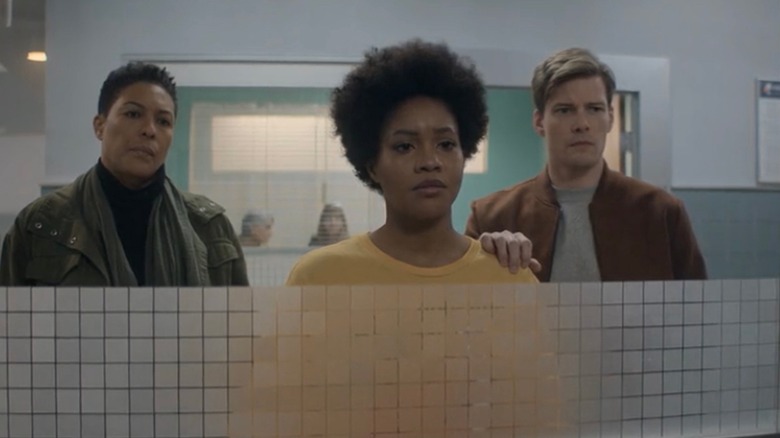The Ending Of The Other Black Girl Explained
Hulu's adaptation of "The Other Black Girl" brings a unique blend of humor and social-change messaging, thanks to the talented showrunners Jordan Reddout and Gus Hickey. Drawing from their experience working on shows like "Grown-ish" and "Black-ish," they infuse the series with humor and thought-provoking social commentary. But this show isn't limited to those alone; it also incorporates various genres and elements to construct a satisfying and multifaceted storyline.
At its core, the narrative revolves around Nella (Sinclair Daniel) and her complex relationship with her opportunistic co-worker at Wagner Books, Hazel (Ashleigh Murray). Throughout the season, the tension between them escalates as manipulation and sabotage come into play. However, the plot takes an intriguing turn when it is revealed that Nella has been secretly collaborating with former editor Kendra (April Parker Jones) to take down Wagner. This unexpected twist adds depth to the narrative and raises questions about loyalty, ambition, and the pursuit of justice.
Moreover, "The Other Black Girl" delves into a world where the workplace is gradually embracing diversity, a concept championed but still evolving globally. The series offers a captivating mix of humor, thrills, and incisive social analysis, making it a compelling and thought-provoking watch. Let's delve deeper into the intriguing ending of the series and explore its implications.
What you need to remember about the plot
Nella Rogers has been the sole Black female employee at Wagner Books for quite some time. However, her world is shaken when Hazel is hired one eventful morning, making her the second Black woman in the office. Nella is initially excited about the prospect of having someone who can relate to her unique experiences.
Their friendship begins on a positive note as they sit in neighboring cubicles, but it doesn't take long for Nella to realize that Hazel has hidden agendas. Trouble brews when Hazel engineers a heated argument between Nella and their best-selling author Colin Franklin (Brian Baumgartner), who has penned a racially insensitive book. This orchestrated confrontation lands Nella in hot water with her superiors.
As Nella's life takes a turn for the worse, she starts to feel haunted by the memory of Kendra Rae Phillips, a former editor at the publishing company. In a flashback episode, viewers learn that Kendra and her friend Diana (Garcelle Beauvais) had a falling out over the conclusion of Diana's influential book "Burning Heart." To escape the cult-like group Diana was forming with Richard Wagner, which aimed to pressure Black women into forsaking their identities in favor of conforming to American society's expectations, Kendra faked her death.
What happened at the end of The Other Black Girl
In the lead-up to the finale of "The Other Black Girl," significant revelations come to light. Viewers now understand that the "hair grease" Hazel gave to Nella had brainwashing properties, leading to Nella's mental instability and disruptive hallucinations.
However, what truly alters the course of events for Nella is a confrontation during a work event, when she loses her composure and attempts to expose Richard, Hazel, and Diana for their manipulative agenda aimed at Black women in the industry. Despite disbelief from those present, the situation bears eerie similarities to the past conflict between Diana and Kendra. Diana decides to take action and goes after Nella. Intriguingly, Nella vanishes before Diana can apprehend her, embarking on a mysterious journey that culminates in her forming an alliance with Kendra. Together, Nella and Kendra craft a plan to challenge and ultimately dismantle Wagner Books' control over Black women in the corporate world.
Nella then reappears at the office with a noticeably different hairstyle. Suddenly, she appears to be echoing the same sentiments as Diana and Hazel, making them believe they have broken her resolve. Unbeknownst to them, this is all a ruse orchestrated by Nella under Kendra's guidance. They conspire to kidnap Jesse Watson (Langston Kerman), a podcast host who's come under Diana's power and is about to publish a book they suspect will be detrimental to the culture.
What the ending of The Other Black Girl means
"The Other Black Girl" incorporates various genres, with horror and comedy being the most prominent. The series draws inspiration from films like "Get Out" and "Rosemary's Baby" to explore themes of women's agency and the contemporary appropriation of race relations by corporations. As Kendra teams up with Nella, her boyfriend Owen (Hunter Parrish), and her best friend Malaika (Brittany Adebumola) to plot against Jesse and prevent the release of his upcoming book, the show emphasizes that bringing about real change requires collective effort.
Decades earlier, Kendra attempted to prevent Diana's book from reaching the public. While everyone acknowledged the book's quality, the critical issue was whether its ending was harmful to future generations. Diana aimed to create a story that, despite being detrimental to the self-perception of her primarily Black female audience, remained appealing to other demographics for financial success. Kendra and Nella strongly disagree with this approach and have finally taken a stand to fight back.
The finale of "The Other Black Girl" also addresses the long-held question of whether the challenges faced by Black individuals in the corporate world are mere figments of their imaginations. The corporate environment can often feel unwelcoming and inhospitable to those from diverse backgrounds. The series skillfully navigates these issues to craft a compelling and socially relevant narrative.
What you need to remember about Diana
Diana's introduction to Richard Wagner came through her friend Kendra, who worked at Wagner Books. Together, the three collaborated on a highly successful book that elevated the publisher's status in the industry. However, the book's ending was considered too cautious by Kendra's standards, leading to a falling out between her and Diana. This ending continues to be a subject of debate in the present-day timeline of the show, with Nella advocating for a new edition of the book featuring the originally intended closing. This alignment in their view serves as a clear indicator of the shared mindset between Kendra and Nella.
Diana then joined forces with Richard to pursue drastic measures against Kendra. From that point on, Diana began disseminating her principles to individuals she deemed worthy. While her subjects experienced significant transformations, going from humble beginnings to powerful positions in American corporate culture, Diana's methods involved using a hair product known as "hair grease" to make Black women suppress their true identities and appear more acceptable.
Diana is a complex villain in the story. Her opposition isn't to Black women advancing in the corporate world or posing competition to her but rather to certain ways that they achieve success. Diana firmly believes that Black women must adhere to her specific notions of professionalism, and she's willing to go to extreme measures to ensure her ideals are strictly followed, even if it means resorting to violence and manipulation.
What you need to remember about Kendra
The first character the audience sees in the entire show is Kendra. She's panicking, stressing, and running away from a very concerning threat that remains fully undefined until the very final episode. By the finale, fans already know that Richard is having a longstanding affair with Diana and they basically make all decisions as a unit.
Kendra challenged this unit when she tried to reveal to the media all those years ago that she felt that the ending of Diana's book was not only poor — in her opinion as the editor — but also harmful. That causes Diana and Richard to drive Kendra into hiding. She only then reappears when she realizes that Nella is just like her and with Kendra's experience and lessons, Kendra can finally right the wrongs created by Richard and Diana all those years ago.
Kendra exists to show the audience that these issues that are presented in the show — be it racism, microaggressions, or suppression — have always existed in the workplace. But through Nella, the audience can finally see that noting the problems and doing something about them is never enough; someone always needs allies. Kendra's story exists to show that without allies, one can only get so far.
What does the hair grease signify?
"The Other Black Girl" skillfully keeps its supernatural elements shrouded in mystery until late in the 1st season, leaving viewers in suspense about whether these elements are genuine or mere hallucinations experienced by Nella. The eventual revelation unveils the unsettling truth that Diana's hair grease has a gradual brainwashing effect on its users, rendering them more compliant with her ideas and manipulations.
Hair holds immense cultural and emotional significance for Black women, and this theme is deeply explored in the show. The series draws inspiration from Chimamanda Ngozi Adichie's "Americanah," which delves into the complex relationship Black women have with their hair. "The Other Black Girl" effectively employs this motif to shed light on the workplace microaggressions endured by Black women, particularly regarding their hair, which is unfairly stigmatized as unprofessional. The hair grease symbolizes the relentless societal pressure on Black women to conform and modify their appearance to align with a narrow and biased definition of professionalism.
In a poignant narrative twist, the series demonstrates the power of the hair grease in its final episode, as Nella reappears with a conspicuously altered hairstyle. This prompts both Hazel and Diana to assume that Nella has finally succumbed to the allure of the unguent. Ultimately, the grease serves as a tool to subjugate Black women, reinforcing the show's message about conformity and identity.
Vera is more significant than it seems
"The Other Black Girl" brilliantly utilizes its supporting characters to add depth and complexity to the narrative. One of the ways it achieves this is by subtly suggesting that these supporting characters may represent possible futures for the main characters, depending on the paths they choose. An excellent example of this is the parallel between Hazel and Nella's relationship and that of Kendra and Diana.
However, there's another intriguing parallel that emerges, shedding light on the significance of Nella's boss, Vera Parin, portrayed by Bellamy Young. Initially introduced as a supportive boss providing Nella with tips and guidance on advancing from assistant editor to editor, Vera shifts her stance when Nella begins to assert her autonomy and refuses to merely parrot company policies as her own beliefs.
As the series unfolds, Vera faces dismissal from her position, but Nella's challenges prevent her from seamlessly stepping into Vera's shoes. When Nella reappears, feigning submission and implying she has been brainwashed, she is promptly promoted to Vera's former role and even offered the same office. This narrative choice subtly hints that if Nella were to accept this job and follow that same path, she could ultimately become like Vera — quite a bleak prospect.
How complicit is Richard Wagner in all this?
One of the pivotal twists that sends shockwaves through the show is when Vera confides in Malaika, revealing that Richard Wagner (Eric McCormack) and Diana have been engaged in a longstanding affair. This revelation leads Malaika to the realization that it's Richard who uses his connections to place Diana's mentees in influential corporate positions.
While this revelation certainly satisfies fans' curiosity, it leaves the character of Richard Wagner somewhat enigmatic. He appears to maintain a neutral stance throughout much of the series. Richard's character is not overtly racist like the author Colin Franklin, nor does he exhibit the same degree of willingness to compromise principles as Vera. For the most part, Richard appears to be primarily motivated by what enhances his company's public image. This stance keeps viewers guessing about his true motives and benefits within the unfolding conspiracy.
In the end, Richard Wagner is not the mastermind behind the entire scheme; he is complicit because he gains from it. This is evident when Richard suddenly shifts his stance to propose a new business idea centered around selling diversity as a by-product of the publishing company. Richard comes across as a character who is willing to sacrifice anything and anyone to ensure the success of his company. In reality, much like corporate America, Richard is amoral and primarily concerned with profit.
What made Jesse switch sides?
"The Other Black Girl" revolves around an inciting incident triggered by Colin Franklin's racially insensitive book. Nella is the first to voice her concerns about the tome's content, but her warnings fall on deaf ears at Wagner Books. It's only when the book is leaked and Jesse Watson, a prominent author, reads and criticizes it that Wagner decides to drop both the book and its author from their roster.
Richard Wagner's initial response is to bring Diana back to the office for a new book project. Additionally, he assigns Nella the task of recruiting Jesse. However, when Nella approaches Jesse with the proposal, he vehemently rejects it, emphasizing that his principles matter more to him than money. Surprisingly, the next time Jesse appears, he is presented as Wagner's new author, sporting a new haircut and speaking positively about the publishing company.
It's implied that Diana may have taken matters into her own hands to ensure that Jesse aligns with their plans for Wagner. The lure of financial gain might have also played a role in convincing Jesse. In the world of "The Other Black Girl," it becomes evident that nobody's resolve is too strong to be swayed or manipulated.
What the show's creators have said about the ending
The creators of "The Other Black Girl" have been tight-lipped about what the ending might mean for the future of the show, but have shared that there were enough unexplored stories from that world that fans could look forward to.
The series has a story that could really expand as much as the writers want. This expansion could extend not only to the characters but also to the fascinating world of the story. Future seasons could involve Nella and her allies not just battling Wagner's influence directly, but also investigating how and where the hair grease that brainwashes people is actually produced.
It is worth noting that co-showrunner Gus Hickey told the New York Times, "Our style has always been: The world is sad enough as it is, you have to laugh at it or you will not survive." So even though the ending of the show suggests that the series is going to tackle more serious issues and lean more on social commentary as it goes on, the writers will never abandon their comedic style. That sounds like a great decision because the laughs tucked in between the heavier elements make the show an enjoyable watch.
What the ending of Season 1 means for the future of the series
The creators of "The Other Black Girl" have not officially confirmed whether the show will be returning for a 2nd season, and Hulu has yet to announce a decision.
The series features characters like Hazel, who has not yet shown complete conviction in the questionable actions she carries out for Diana. Her character presents the opportunity for redemption and further exploration. Zakiya Dalila Harris, author of the novel and one of the show's creators, mentioned in the same New York Times article that she made Hazel and Nella's relationship more nuanced in the adaptation from her book, hinting at the potential for future seasons to delve deeper into Hazel's character.
Additionally, characters like Kendra and Jesse, who play significant roles in the series, have not been fully explored yet. The show's positive critical reception may encourage more viewers to watch it, potentially leading to Hulu greenlighting a 2nd season to continue the story and develop these characters further.
With the recent announcement of a tentative deal to end the writers' strike, fans can expect the creators of the show to provide more insights into their experiences in making the series and possibly shed light on what the ending means for its future. This could lead to more clarity regarding the potential for a 2nd season and the direction the story might take.
